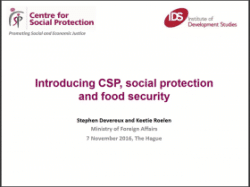
Policy highlights:
- In this presentation Devereux and Roelen explore the potential of various graduation programmes, based on comparative research conducted in six countries.
- As the limitations of simple cash transfers as a tool for achieving food security and sustainable poverty reduction are recognized, combined interventions are increasingly being implemented. Such integrated approaches include: 1) cash transfers + savings provision, to alleviate extreme poverty, and 2) asset transfers + training for livelihood promotion.
- Research shows that sustained poverty alleviation (so-called ‘graduation’ from poverty) is most successfully achieved using a third combined intervention: cash or food + behaviour change communication (BCC).
- Findings suggest that effective graduation can be achieved if the following are taken into account: 1) money is not enough, coaching and support are necessary; 2) the impact of coaching and support stretches beyond direct programme beneficiaries; 3) sustained impact requires sustained investments; and 4) the combination of cash and BCC is particularly effective.






